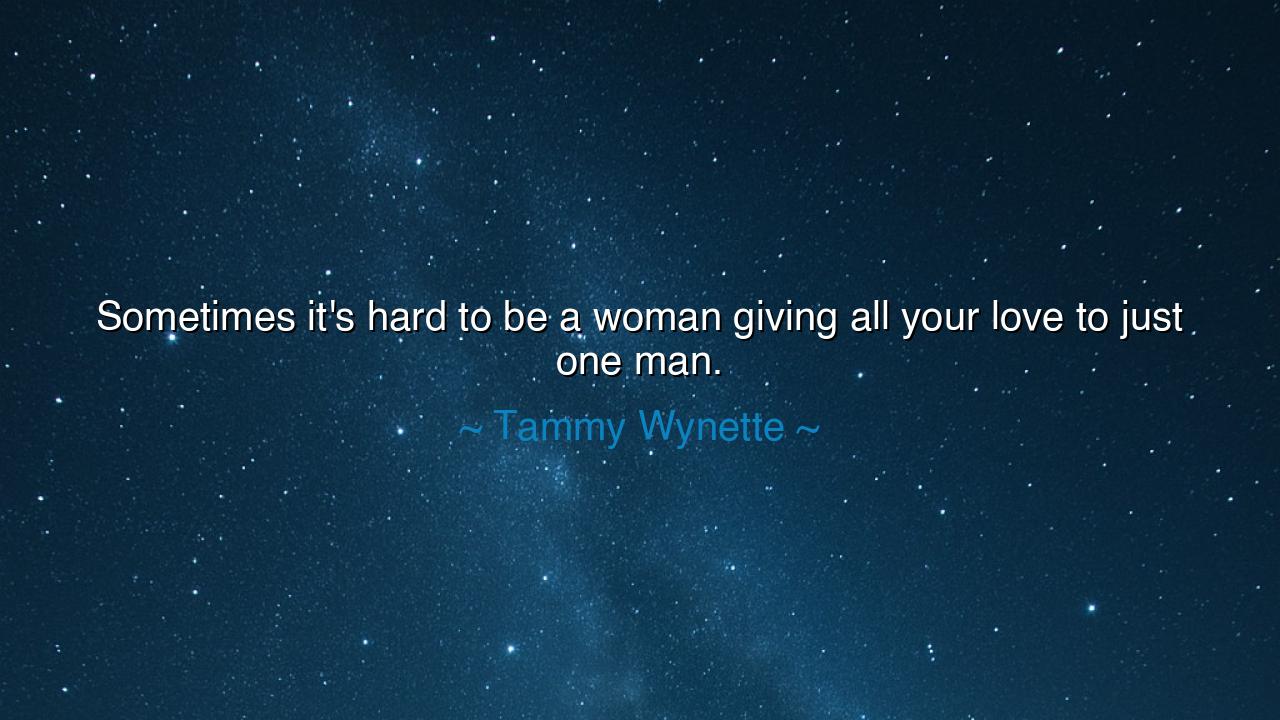
Sometimes it's hard to be a woman giving all your love to just






Tammy Wynette, a voice that touched the hearts of many, once uttered these words, “Sometimes it's hard to be a woman giving all your love to just one man.” These words, though simple, speak to the complexity and the burdens that come with love. They speak of the eternal struggle faced by many women throughout history—the sacrifice of self in devotion to another. Love, in its purest form, is a force that calls for giving without restraint, yet it often asks more than one can offer, leaving the heart stretched thin, wondering if it is enough. To love one deeply, fully, is no light task, and Wynette’s words acknowledge the weight that love can bear.
In the days of the ancients, the wise ones recognized that love is both a gift and a duty, one that calls forth the deepest parts of the soul. The ancient philosophers, such as Socrates and Aristotle, believed that love was not merely an emotion, but a profound force that bound people together. Yet, they understood that the giving of oneself, fully and without reservation, could lead to great personal sacrifice. The love that binds a woman to a man—especially in the context of marriage—can at times feel like a burden, as it asks for selflessness in a world that often prioritizes the individual. And so, the woman’s heart may ache, knowing that in giving her love, she may lose parts of herself, caught between the demand to love and the need to preserve her own identity.
Consider, O children, the tragic story of Antigone, the daughter of Oedipus, whose love for her brother and family led her to defy the law of the king. Her heart was torn between the love for her family, the sacred bond of blood, and the demands of society, which placed restrictions on her actions. In her selfless devotion to her brother, she chose to honor what she believed to be the higher law of love, even at the cost of her own life. Antigone’s sacrifice was not one made lightly, and her words echo across time as a testament to the emotional depth and the personal toll that love can exact. In her, we see the tension that Wynette’s quote brings to the surface: the struggle to love deeply while giving of oneself in a way that may not always be rewarded or reciprocated.
Yet, the story of Penelope and Odysseus offers another perspective on this theme. For years, Penelope waited for her husband’s return, remaining steadfast in her love despite the hardships she faced. While her devotion is one of the most celebrated in history, Penelope’s heart, too, was heavy with the strain of constant loyalty. She gave all her love to a man who was absent, one whose return was uncertain, and though she endured, her own desires and needs were placed second. Her life was a testament to the deep sacrifice that comes with loving another fully and without reservation, and yet, her love was her strength. Despite the difficulty, Penelope’s devotion was not in vain. She was rewarded by the return of Odysseus, yet the question lingers: at what cost does a woman’s love come?
Wynette’s words ring true in the context of the complex nature of love in the modern world as well. How many women give their hearts fully to their partners, to the point of self-neglect? How often does a woman pour herself into the service of another, believing that in her selflessness she will find fulfillment, only to feel empty in return? It is a common tale—one that spans time and culture. The act of giving all of one’s love to another is not always a balanced exchange. It is a challenge to preserve one’s sense of self in the face of such unrelenting devotion. It is a lesson for both men and women: love must be shared, not demanded; it must be reciprocal, not consuming.
O children, what lesson can we draw from this ancient wisdom and the modern struggle that Wynette voices? The lesson is that love, though powerful and transformative, must be given freely but not without thought. In loving, we must remember to also love ourselves—for only in a balanced love can we find peace. A woman, or any person, must not lose themselves entirely in the love they give to another. Love is not about self-sacrifice at the cost of self-identity, but about mutual respect, balance, and recognition of the love that flows both ways.
So, O children, when you love, love deeply, but never forget to preserve your soul in the process. Let your love be freely given, yet let it not strip you of your own strength or your own sense of being. And for those who receive love, remember that it is a gift—a gift that asks for respect and reciprocity, not for possession. In this balance, love finds its true form, its true power.






AAdministratorAdministrator
Welcome, honored guests. Please leave a comment, we will respond soon